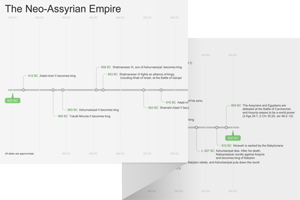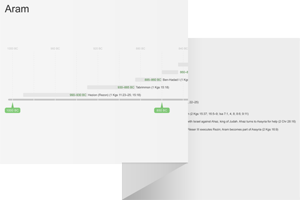16:1–20 During the reign of Judah’s King Ahaz (circa 735–715 BC), the kingdoms of Israel, Aram (Syria), and Edom ally against him. (This alliance occurred in ca. 734 BC prior to the first deportation of Israel recorded in 15:29). In response, Ahaz buys protection from Tiglath-Pileser III of Assyria by giving him all the temple treasures and precious metals, as well as the frames of the bronze stands and the 12 oxen that hold up the sea of cast metal (vv. 5–9, 17; 1 Kgs 7:23–37). Assyrian records from the period corroborate this account, listing Ahaz of Judah among the kings who pay tribute to the throne. |
16:2 David his ancestor Because of his desire to worship Yahweh, David was the standard for upright kingly behavior (1 Kgs 3:6; 9:4; 11:4).
16:3 he even let his son pass through the fire The ot forbids child sacrifice (Lev 20:1–5; Deut 18:9–14; Ezek 16:21; 20:31), but Israel’s neighbors practiced it (2 Kgs 3:27). The kingdom of Israel and King Manasseh of Judah also were guilty of this evil (17:17; 21:6).
16:4 high places, on the hills, and under every green tree A standard phrase describing the location of Canaanite religious sites, which often were associated with fertility (Deut 12:2–3; Jer 2:20; Ezek 6:13).
16:5 Rezin the king of Aram The last of this kingdom’s rulers before it was conquered by Assyria. Rezin was executed by Tiglath-Pileser III in 732 bc.
King of Syria | Date | Southern King | Date |
Rezin | 740–732 bc | Jotham | 742–735 bc |
Ahaz | 735–715 bc |
16:6 Elath See 2 Kings 14:22 and note.
16:7 your servant Ahaz makes Judah a vassal of the Assyrian Empire.
16:8 a gift The Hebrew word here connotes a bribe and this decision involves Judah willingly being subjected to a foreign power and its gods (compare Deut 5:6–7). Mosaic law forbade the offering of bribes, and other ot passages highly criticize the practice (e.g., Exod 23:8; Deut 16:19; Prov 17:23). According to Assyrian accounts, Ahaz also pays tribute to Tiglath-Pileser III, which could be a reference to his gift (or bribe); Ahaz likely also had to pay regular tribute.
Date | Event |
745 bc | Tiglath-Pileser III becomes king |
734 bc | Tiglath-Pileser defeats Pekah |
727 bc | Shalmaneser V becomes king |
725–722 bc | Assyrians besiege Samaria. The Israelites are defeated and sent into exile. |
16:9 to Kir Likely refers to a region of Mesopotamia; the precise location is unknown. Amos 9:7 indicates that Kir is where the Arameans (Syrians) originated.
16:10 Uriah the priest A supporter of the prophet Isaiah (Isa 8:2), which suggests he is faithful to Yahweh (at least later on).
16:13 he offered his burnt offerings Kings often inaugurated new altars by performing sacrifices (e.g., 2 Sam 6:17–18; 1 Kgs 8:63; 12:32).
 Altars in the Old Testament Table
Altars in the Old Testament Table
16:14 the bronze altar Likely a reference to the altar established during Solomon’s era (1 Kgs 8:64).
16:17 cut off the side panels of Ahaz dismantled certain bronze features of Solomon’s temple—possibly in order to give the metal to Tiglath-Pileser III (2 Kgs 16:8). For details regarding the stands, see 1 Kgs 7:27–37; for details on the sea and oxen, see 1 Kgs 7:23–26.
16:18 because of the presence of the king of Assyria The Hebrew phrase used here may indicate that Ahaz had been ordered by Tiglath-Pileser III to make these changes to the temple, in order to obtain the goods necessary for his tribute payment to Assyria. It could also be a reference to Ahaz setting aside this portion of the temple so it would be out of sight of anyone from Assyria.
16:19 the events of the days of the kings of Judah See note on 2 Kings 1:18.

|
About Faithlife Study BibleFaithlife Study Bible (FSB) is your guide to the ancient world of the Old and New Testaments, with study notes and articles that draw from a wide range of academic research. FSB helps you learn how to think about interpretation methods and issues so that you can gain a deeper understanding of the text. |
| Copyright |
Copyright 2012 Logos Bible Software. |
| Support Info | fsb |
 Loading…
Loading…



